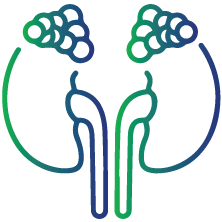
Antinuclear Antibody (ANA) Test
About ANA test
The antinuclear antibody (ANA) test is a diagnostic test that detects the presence of antinuclear antibodies in your blood. Anti-nuclear antibodies are antibodies (proteins) that react or fight with the body’s normal tissues and organs. ANA test helps in detecting and diagnosing autoimmune diseases. Thus, getting your ANA test done is recommended to prevent various immune-mediated complications.
ANA test is also knowns as
Antinuclear antibody panel, fluorescent antinuclear antibody, FANA, and ANA reflexive panel.
What is an ANA test used for?
ANA test is used to diagnose autoimmune diseases like:

Systemic lupus erythematosus (SLE)

Rheumatoid arthritis (Joints)

Scleroderma (Skin)

Sjogren's syndrome (Exocrine glands)

Addison Disease (Adrenal gland)

Autoimmune hepatitis (Liver)

Psoriasis (Skin)

Type 1 diabetes (Pancreas)

Thyroid diseases (Autoimmune)
Who should get tested?
ANA test is recommended to be performed frequently for individuals who show symptoms of an autoimmune disease. The symptoms vary depending on the affected body part. The common symptoms include:

Fever

Fatigue

Weight loss

Muscle or joint aches

Rashes

Recurrent sores

Hearing loss

Vision loss

Blood in urine

Abdominal pain
Test preparation:
No special preparation is required for an ANA test.
Interpretation of the results
The result may come as positive or negative.
Negative result
If your test results were negative, it indicates the absence of antinuclear antibodies in your blood. It means that you are less likely to have an autoimmune disease.
Positive result
If your test results were positive, it indicates the presence of antinuclear antibodies in your blood. It means that you are more likely to have an autoimmune disease.
The presence of an autoimmune disease is not necessarily confirmed by a positive ANA test result. Some people with normal health may test positive for ANAs. A positive outcome may also be linked to specific malignancies, drug usage, viral infections, and other medical disorders. If the test is positive, your doctor could recommend more testing, especially if you continue to have symptoms of an autoimmune condition.
FAQs
What is the significance of ANA testing?
An ANA test is performed to identify, quantify, and assess the presence of ANA in your blood sample. ANA testing can help doctors diagnose autoimmune diseases and give them information that might help them further identify the type of autoimmune disease you have.
What happens during an ANA test?
Your healthcare provider will use a tiny needle to take blood from a vein in your arm. After the needle is placed, a little amount of blood will be collected into a test tube or vial. When the needle enters or exits, you may experience a slight sting. This procedure usually takes less than few a minutes.
What are the risks associated with the ANA test?
An ANA blood test carries a negligible risk. The area where the blood was drawn may cause you little discomfort or bruise. But any discomfort or bruises should disappear fast.
Should I Be worried about Positive ANA Test Results?
A positive ANA test may indicate an autoimmune disorder, but this is not always the case. To decide what to do next, you should consult your doctor
How long should I wait for the ANA test results?
It can take a while for the test results. Within 2-3 working days, results may be available and can be communicated via phone, mail, or electronic means

